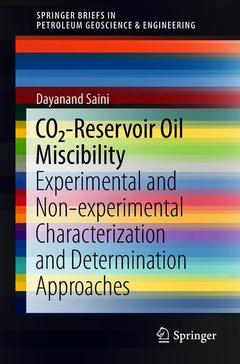CO2-Reservoir Oil Miscibility, 1st ed. 2019 Experimental and Non-experimental Characterization and Determination Approaches SpringerBriefs in Petroleum Geoscience & Engineering Series
Auteur : Saini Dayanand

This SpringerBrief critically examines the latest experimental and non-experimental approaches used for the fast and reliable characterization and determination of CO2-reservoir oil miscibility in terms of the minimum miscibility pressure (MMP).
This book serves as a one-stop source for developing an enhanced understanding of these available methods, and specifically documents, analyses, and evaluates their suitability and robustness for depicting and characterizing the phenomenon of CO2-reservoir oil miscibility in a fast and cost-effective manner. Such information can greatly assist a project team in selecting an appropriate MMP determination method as per the project?s need at a given project?s stage, be that screening, design, or implementation.
CO2-Reservoir Oil Miscibility: Experiential and Non-Experimental Characterization and Determination Approaches will be of interest to petroleum science and engineering professionals, researchers, and undergraduate and graduate students engaged in CO2 enhanced oil recovery (EOR) and/or simultaneous CO2-EOR and storage projects and related research. It may also be of interest to engineering and management professionals within the petroleum industry who have responsibility for implementing CO2-EOR projects.
Dr Dayanand Saini is an Associate Professor of Petroleum Engineering at the California State University, Bakersfield (CSUB), California, USA, where, apart from teaching various core engineering and petroleum engineering electives, he is one of the principal investigators for five year-long National Science Foundation (NSF) research project focused on investigating the feasibility of CO2 enhanced oil recovery (EOR) process in depleted Californian oil and gas fields and using CO2 injection as drive mechanism to produce formation water for beneficial reuses. He is also a recipient of a planning grant awarded by the U.S. Department of Energy (DOE) to a consortium including CSUB, Electric Power Research Institute (EPRI), and Lawrence Berkeley National Laboratory (LBNL) for their project entitled “California CO2 Storage Assurance Facility Enterprise (C2SAFE)”. Dr Saini has published more than a dozen technical articles in his areasof expertise. He is also the author of the newly published book entitled “Geologic CO2 Storage: Synergy Between EOR and Storage”. He has presented numerous presentations at national and international technical conferences, served as a grant reviewer for American Chemical Society (ACS), and reviewed book proposals for major publishers. He serves on the editorial board of several technical journals and reviews articles for more than half a dozen premium scientific journals.
Date de parution : 07-2018
Ouvrage de 104 p.
15.5x23.5 cm



